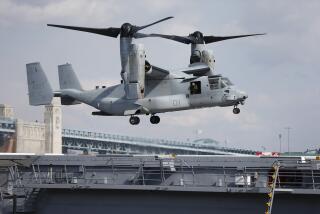Stealth Program : Northrop Faces New Scrutiny of Purchase System
Northrop has failed to obtain Air Force approval of its purchasing system for the Stealth bomber program at its Pico Rivera plant, a disclosure that comes amid a national controversy over irregular purchasing practices at another Northrop division, it was learned Monday.
The Air Force, in one of the few official statements it has ever issued about the top-secret Stealth program, said the Pico Rivera purchasing system “has not received final approval as being totally compliant with government purchasing criteria established by the Air Force.”
Although the lack of such formal approval by itself would not represent a critical deficiency for a defense contractor, the question that it raises is whether Northrop has systemic corporate problems in managing its purchasing operations, congressional sources said.
Investigation Sought
Rep. Les Aspin (D-Wis.), chairman of the House Armed Services Committee, has asked for an investigation into the Stealth program’s purchasing system by the General Accounting Office, The Times has learned.
The Air Force plans to buy 132 of the nuclear-armed bombers, which are being designed to evade detection by enemy radar.
Northrop has acknowledged that it has engaged in a number of irregular practices at its electronics division in Hawthorne, including the use of fictitious companies to spend $381,000 of so-called petty cash to purchase small electronic parts for the MX missile program.
Northrop created the fictitious companies because its official purchasing department was beset by problems. Air Force audits, which were obtained by The Times, confirm that the Pentagon had repeatedly warned Northrop about its shortcomings.
Moreover, Northrop admitted before the Armed Services Committee last week that it bought $14,000 worth of parts for the Stealth bomber program through the fictitious companies at its electronics division. The parts, characterized by Northrop Group Vice President David Ferguson as “nuts, bolts and screws,” were for secret equipment that the electronics division is building for the Stealth program.
In asking for the GAO audit, Aspin said: “This unusual practice raises a number of concerns.” A letter Aspin sent last week to Comptroller General Charles A. Bowsher asked for an investigation into the extent to which fictitious companies have been used in the Stealth bomber program and whether the Air Force has approved the Northrop purchasing system.
Ferguson told the committee last week that fictitious companies will not be permitted in the future and insisted that Northrop was not trying to deceive anybody by using phony names, such as Liaison Engineering Services, South Coast Engineering and Blue Laser Systems.
Northrop is still looking into allegations, Ferguson said, that thousands of parts were tossed into garbage dumpsters at the electronics division plant in Hawthorne because Northrop ended up with too many parts as a result of the operation of the fictitious companies.
Any such problems found in the Stealth program would represent a serious threat to Northrop because the company derives an estimated 50% of its sales from the bomber program. Aspin has already called for a competition that could jeopardize Northrop’s sole-source contract to develop the bomber.
The company has written off $210 million against profit in the past nine months on the Stealth bomber program, formally known as the Advanced Technology Bomber. Growth in the development cost of the bomber is partly to blame for the writeoffs, but experts say such cost growth in a complex new technology is not unusual.
The reasons for the Air Force withholding approval of the purchasing system were described by a Northrop insider “as a failure to exercise sound procurement practices and good management procedure.”
But Air Force officials, in response to a reporter’s questions, tried to put the best possible face on the situation, saying: “We have been reviewing current purchasing practices as well as ensuring (that) their purchasing system, when fully implemented, will be acceptable for application to government contracts. In addition to the Air Force Contract Management Division review, the Defense Contract Audit Agency evaluates contractor billings to ensure that we get full value for our money.”
The Air Force said it has been evaluating the Northrop purchasing system at Pico Rivera for 2 1/2 years, ever since the service installed a representative at the plant.
Congressional sources said Northrop has been unable to satisfy the Air Force on the purchasing system and is in a situation of deficiency, an interpretation that differs from that of the Northrop insider and of Air Force officials, who say the lack of approval is not unusual at this point in a development program.
A company spokesman declined to comment on the matter.
Formal disapproval of a purchasing system can limit the freedom of a defense contractor, according to contracting experts. In some cases, the Air Force requires that it approve all purchases over a certain dollar limit, creating a cumbersome bureaucracy for a contractor to deal with.
More to Read
Inside the business of entertainment
The Wide Shot brings you news, analysis and insights on everything from streaming wars to production — and what it all means for the future.
You may occasionally receive promotional content from the Los Angeles Times.











